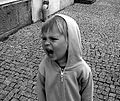
ADHD
Enough Is Enough Series Part 5: ADHD Is Exposed
The French got this one right.
Posted September 16, 2016

Okay. The time has come that the ADHD qualifies for my "Enough Is
Enough" series. Marilyn Wedge, Ph.D. (in her article published in Psychology Today online, March 8, 2012, “Why French Kids Don’t Have ADHD”) shows that that the discussion is over.
The basic fact is that ADHD doesn’t exist in France, where the incidence is less then 0.5% of school aged children. In contrast, almost 20% of boys in the U.S. will have been diagnosed with ADHD. One in five boys—a 37% increase since 2003. Perhaps boys in the U.S. contracted some contagion that is spreading exponentially, but fortunately, the boys in France have been spared.
If ADHD doesn't exist in France, how can it be a brain disease? Yes, there can be symptoms of hyperactivity and concentration. But it is created by psychosocial causes, not biological ones. And the treatments should be appropriate to the cause.
The number one responsibility of all societies, is to raise their children well. Ideally, there should be intact families, and an intact village. Yes, it takes a village to raise a child. Children must be raised with boundaries and love. To provide the best holding environment for our children has to be our parental imperative.
We need to encompass the full scope and grasp of the forces of life as accurately as possible to provide the necessary guidance to our children every step of the way until adulthood. Life is difficult, and its exigencies must be appreciated. This is very hard work.
In France, as Marilyn Wedge points out, “From the time their children are born, French parents provide them with a firm cadre—the word means 'frame' or 'structure.' Children are not allowed, for example, to snack whenever they want. Mealtimes are at four specific times of the day. French children learn to wait patiently for meals, rather than eating snack foods whenever they feel like it. French babies, too, are expected to conform to limits set by parents and not by their crying selves. French parents let their babies 'cry it out' (for no more than a few minutes, of course) if they are not sleeping through the night at the age of four months… French parents have a different philosophy of discipline. Consistently enforced limits, in the French view, make children feel safe and secure. Clear limits, they believe, actually make a child feel happier and safer—something that is congruent with my own experience as both a therapist and a parent [mine too]. Finally, French parents believe that hearing the word 'no' rescues children from the 'tyranny of their own desires.'”
With variations of course, this is the correct model of raising children. It is a good balance of boundaries and love. This is how children “learn self-control early in their lives.”
The French correctly understand that the causes of children’s symptoms are psychosocial. When symptoms of ADHD exist, where children are out of control, the treatment is psychotherapy and family counseling. The full implication of this article is that there is no need to consider some genetic biological disease, that doesn’t exist.
In contrast to France, the intactness of our culture has dangerously deteriorated. The divorce rate in the United States is 53%. Single parents have more than tripled as a share of American households since 1960. Today, one-third of American children—a total of 15 million—are being raised without a father. Nearly 5 million more children live without a mother.
These are just the broad outlines. With all the difficulties of blended families, alcoholism, drug addiction, child abuse, child sexual abuse, emotional abuse, parental sickness and deaths, physical disease and disability of both parents and children, emotional difficulties of parents, i.e. trauma of all kinds. It is well-documented that these conditions leave children sadly prone to serious problems in life.
Yes, certain children can spin out of control behaviorally or mentally. This does not mean there is a biological disease. Never mind that no biological basis has ever been found. The real explanation is certain kids with an active temperament (in combination with other aspects of temperament) may be prone to get out of control and be difficult to handle. This kind of symptomatic expression is exacerbated when they are subject to trauma. (See "No, There is No Such Thing as ADHD.")
Yes it is additionally true that some of these active kids are sensitive to certain food additives, artificial colors and preservatives, so it is simple common sense to avoid such things. This does not suggest there is a brain disease. Active children are not a disease; many of these kids of this temperament become great athletes and leaders.
Other kids with different temperaments will develop different symptoms in relation to trauma from difficult family lives: depression, anxiety, phobias, obsessions, compulsions, psychoses, when subject to trauma. These symptoms reflect different temperamental orientations of the child. These other symptoms likewise are not biological diseases. (See “The Nature-Nurture Question.") I should point out that such symptoms don’t necessarily reflect parental abuse. There are many inadvertent causes, life tragedy causes, as well as hidden characterological causes in well meaning parents. This is not about parental blaming, but the well-being of our children.
I repeat: The evidence is in. You can’t have it both ways. The French situation with ADHD shows conclusively that it is psychosocial, and not a brain disease. In fact all psychiatric symptoms in children are trauma based, and not some biological-neurological disorder of the brain.
American psychiatry has gone off the deep end. Once damage has been done, it is hard work to recover our best selves. We shouldn’t be drugging our children. Treating children with family therapy and psychotherapy is not only the real treatment, but it is inspiring and exciting to see patients thrive and fulfill their authenticity and their ability to love. This puts them in the very best position to raise their own children in a wholesome manner themselves.
Family therapy, behavioral interventions, boundaries, and intelligent school interventions are what makes such a difference in the well being of these children who are out of control. Parents would be far better off to watch a few episodes of the “Super Nanny” on television to see how boundaries and love can transform these out of control kids. This is such a contrast to submitting to psychiatric experts who preach that children are biologically brain damaged. American psychiatrists today drug our children, with of all things, amphetamines and their cousins. (I won’t go into what destructive drugs amphetamines are at this time.) It has to stop.
As a society we are in deep trouble. We have lost our way with raising our children. We have to re-establish a clear pathway to do our number one job right. It is very hard to raise kids. You cannot love well in the absence of the provision of respectful boundaries. As a society, we have fallen way short of this.
I believe most people mean well and need a responsible and responsive place to turn when problems develop. I believe raising our children well should be the number one priority of our society. Psychiatry has abdicated its responsibilities to be a constructive force. As a psychiatrist I am beyond troubled, We, as a society have focus on the children, and recover from the harm done by bad psychiatry that has lost its way. The French have got this one right.
Robert A. Berezin, MD is the author of Psychotherapy of Character, the Play of Consciousness in the Theater of the Brain



